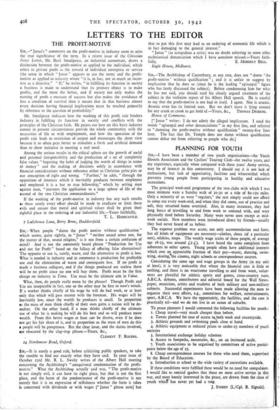PLANNING FOR YOUTH SIR,—I have been a member of two
youth organisations—the Youth Hostels Association and the Cyclists' Touring Club—for twelve years, and my experience, especially when compared with three years' Army service, may be of intertst in this controversy. I should say it is not lack of enthusiasm, but lack of opportunity, facilities and wherewithal which prevents young people from participating in healthy and educative recreations.
The principal week-end programme of the two clubs with which I was most intimate were a Sunday walk of 20-30 or a ride of 80-120 miles. Only a minority of us were "regulars," the rest simply could not afford to come out every week-end, and when they did come, out of practice and soft, they returned home overtired. Also, in many instances, they had long houi-s of travelling to and from work to contend with, and were physically tired before Saturday. Many were never seen except at mid- week socials. New members were introduced direct by friends—usually they had never heard of us before.
The expense problem was acute; not only accommodation and fares, but all kinds of equipment are necessary—clothes, shoes (of a particular sort), oilskins, maps- The weekly wage scales of these people, of average age 18-23, was around £2-k3. I have heard the same complaint from adherents to other sports. Young people often have additional interests which cost an appreciable fraction of their pay—music, dancing, swim- ming, skating, the cinema, night schools or correspondence courses.
Considering the same age and wage groups in the Army (in my unit at least), it is very noticeable that where the financial cost is little or nothing, and there is no wearisome travelling to and from work, volun- teers are plentiful for athletic sports and games, cross-country runs, A.B.C.A. debates, contributors and editorial board for the Wall News- paper, musicians, artists and students of both military and non-military subjects. Successful experiments have been made allowing the men to organise their own affairs, e.g., cornmittees for welfare, entertainments, sport, A.B.C.A. We have the opportunity, the facilities, and the cost is practically nil—and we do not live in an ocean of suburbs.
To peace planners I would commend the following facilities for youth' i. Cheap travel—very much cheaper than before.
2. Towns planned for ease of access toboth work and countryside.
3. Athletic grounds and swimming pools close at hand.
4. Athletic equipment at reduced prices to under-25 members of youth societies 5. International exchange holiday schemes.
6. Access to footpaths, mountains, &c., on an increased scale.
7. Youth associations to be organised by committees of active partici- pants below the age of 25.
8. Cheap correspondence courses for those who need them, supervised by the Board of Education: 9. Introduction at school to the wide variety of recreations available.
If these conditions were fulfilled there would be no need for compulsion. I would like to remind ;Faders that those on most active service in this war, and most keenly interested in the peace, are drawn from the class of youth whicr has never yet had a votg.
J. STOREY (L/Cpl. R. Signals).


























 Previous page
Previous page